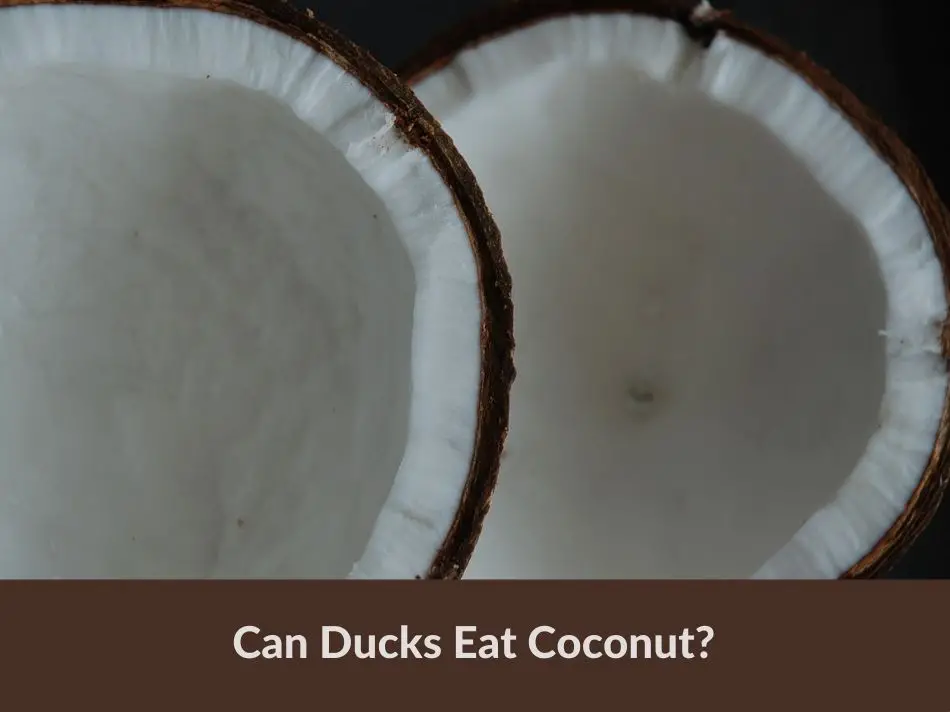Ducks are omnivores, meaning they have a varied diet consisting of both plant and animal matter. In their natural habitat, ducks feast on a range of foods including small fish, insects, worms, algae, and various types of vegetation. But, can ducks eat coconut?
Yes, ducks can eat coconut. Coconut contains a variety of nutrients that can be beneficial for ducks, like essential fats and minerals. The fibrous texture of coconut meat can aid in digestion, but, like any treat, coconut should be given in moderation.
In this article, readers will gain insight into the diet of ducks and whether coconut can be safely incorporated into their meals. We will explore the recommended frequency of offering coconut to ducks, considerations for ducklings, and the implications for caretakers and park visitors who might consider feeding ducks.
How Often Can I Feed My Ducks Coconut?
Coconut should be regarded as a treat rather than a primary food source for ducks. Hence, you can offer coconut to your ducks once or twice a week in small amounts.
Can Ducklings Eat Coconut?
Ducklings have a slightly different dietary requirement compared to mature ducks. During their initial stages of growth, they need protein-rich food for healthy development. While coconut can be offered to ducklings, it should be in even more limited quantities than for adult ducks.
If a caretaker chooses to introduce coconut to ducklings, it’s vital to provide it in very finely shredded or mashed form to reduce the risk of choking.
Is Coconut Healthy For Ducks?
Coconuts offer a distinctive set of nutritional elements that can have both positive and potential implications for ducks when introduced to their diet.
Here’s a deep dive into what coconuts bring to the table for our feathered friends:
- Fatty Acids: One of the primary components of coconut is its fat content, especially in the form of medium-chain triglycerides (MCTs). These fats can be a source of quick energy for ducks. The presence of lauric acid, a type of MCT, is also notable as it has antimicrobial properties.
- Minerals: Coconuts contain essential minerals such as potassium, calcium, magnesium, and phosphorus. These minerals can be beneficial for ducks as they support various bodily functions. For instance, calcium is crucial for bone health and eggshell formation in laying ducks.
- Vitamins: Coconuts are a source of certain B-vitamins, especially folate and pyridoxine (vitamin B6). While ducks generally get these from their typical diet, the additional boost can be advantageous in small amounts.
- Fiber: The fibrous nature of coconuts can aid in digestion. Dietary fiber promotes healthy bowel movements and can potentially help in the prevention of certain digestive issues in ducks.
- Water Content: Fresh coconut also offers hydration due to its water content, especially if you’re considering giving ducks coconut water or fresh coconut meat.
- Natural Sugars: Coconuts contain natural sugars, like fructose, which provide energy. Yet, too much sugar isn’t ideal for ducks, so it’s another reason to limit the quantity of coconut offered.
- Protein: While coconuts do contain protein, it’s in minimal amounts. Ducks, especially ducklings, require a higher protein intake for growth and maintenance, so relying on coconuts for protein needs wouldn’t be advisable.
- Antioxidants: Coconuts have compounds that act as antioxidants. These are beneficial in fighting off free radicals in the body, which can cause cellular damage.
Potential Implications:
- High Fat Content: While the fats in coconuts can be beneficial, excessive intake can lead to obesity or other health issues in ducks. A fatty diet can especially be problematic for domesticated ducks that might not be as active as their wild counterparts.
- Natural Sugars: As previously mentioned, the sugars in coconuts, when consumed in large quantities, might not be ideal for ducks. It can potentially lead to weight gain or even metabolic issues if not monitored.
How To Feed Coconut To Ducks
- Choose Fresh Over Processed: Always opt for fresh coconut rather than store-bought varieties that might contain additives, preservatives, or added sugars. Fresh coconut is more natural and likely healthier for ducks.
- Shred or Chop: To prevent choking and make it easier for the ducks to eat, shred or finely chop the coconut meat. This step is crucial, especially when offering coconut to ducklings.
- Limited Quantities: Remember, coconut is a treat, not a main food source. Provide ducks with only small amounts of coconut to avoid overfeeding and potential nutritional imbalances.
- Clean the Coconut: Before feeding, rinse the coconut to remove any dirt or contaminants. If you’ve purchased a whole coconut, crack it open and extract the meat.
- Avoid Sweetened Coconut: If you’re not using fresh coconut, always double-check the label. Avoid varieties that are sweetened or have any other additives.
- Provide Water: Always offer ducks fresh water when feeding them coconut or any other food. They use water to help swallow and digest their food, making it an essential accompaniment to any meal.
More Fruits Ducks Can Eat
Ducks, much like other animals, appreciate a varied diet, and fruits can be a delightful treat for them. While it’s imperative to introduce any new food in moderation, many fruits are safe and nutritious for ducks.
Below is a list of some fruit options that are duck-approved:
Remember to view our complete list of duck-friendly fruits.
Conclusion
In conclusion, while coconuts do offer a range of nutritional benefits for ducks, it’s crucial to introduce them in moderation. Being aware of both the positive and potential implications of coconut in a duck’s diet allows caretakers to make informed decisions.
Disclaimer: The information in this article is for informational purposes only. I'm not an expert or a veterinarian.


